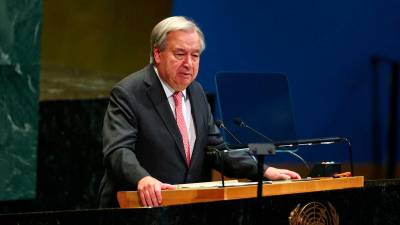NEW YORK: United Nations Secretary-General Antonio Guterres has warned that a wave of misogyny is rolling across the world as leaders marked the 30th anniversary of the landmark Beijing women’s rights conference.
Guterres told world leaders that hard-won gains for women’s rights are under attack during a meeting held a day before speeches begin at the 80th session of the UN General Assembly.
The 1995 United Nations Fourth World Conference on Women in Beijing produced the famous declaration that women’s rights are human rights by then-US first lady Hillary Clinton.
At that conference, 189 nations signed a document calling for full and equal participation of women in all aspects of political, civil, economic, social and cultural life.
Guterres described the Beijing Declaration and Platform for Action as the most ambitious global political commitment to women’s rights ever achieved.
He noted that progress has been slow and uneven three decades after the landmark agreement.
Many leaders used the occasion to recommit to the principles established in the 1995 Beijing declaration.
Liechtenstein Deputy Prime Minister Sabine Monauni stated that the meeting occurs at a pivotal time for the empowerment of women and girls.
She observed that recent years have witnessed a significant backlash to gender equality across many nations.
This backlash has manifested in various forms including legislative rollbacks and the proliferation of misogynist rhetoric in parliaments and public office.
Other leaders expressed concern about the continued shortage of women in prominent United Nations positions.
They noted that no woman has ever served as secretary-general during the world body’s 80-year existence.
Annalena Baerbock, president of the 80th General Assembly, revealed that one in three women globally will experience sexual violence during their lifetime.
She emphasised that no country in the world has achieved pure equality between women and men.
Baerbock added that in many places speaking about women’s rights remains a matter of life and death.
Huang Xiaowei, deputy head of China’s National Working Committee on Children and Women, reported that nearly 10% of women remain trapped in extreme poverty worldwide.
Leaders identified war and climate change as major factors intensifying pressure on women’s rights globally.
United Nations Entity for Gender Equality executive director Sima Bahous stated that about 676 million women and girls live within reach of deadly conflict.
This figure represents the highest recorded number since the 1990s according to UN data.
Bahous detailed how women and girls in crises suffer unspeakable atrocities from Afghanistan and the Democratic Republic of Congo to Gaza, Sudan, Ukraine and Yemen.
She emphasised that women and girls consistently bear the brunt of crises around the world.
Several leaders highlighted technology as a new and unexpected hurdle in the fight for women’s rights.
Guterres warned that technology is spreading hate like a virus while artificial intelligence reshapes our world.
He expressed concern that this transformation is unfolding in an industry dominated by men and shaped by biased data.
The UN chief noted that algorithms frequently reinforce discrimination against women rather than reducing it.
Suriname’s first female president Jennifer Geerlings-Simons identified the negative influence of social media on self-image as another emerging challenge. – Reuters
